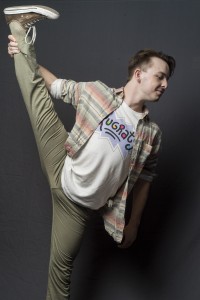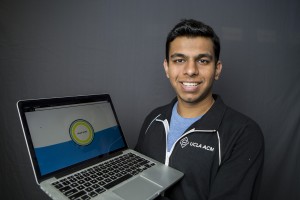Three UCLA undergraduate students will speak about dance, air pollution and waste disposal among a lineup of professionals and experts at the sixth annual TEDxUCLA event in Royce Hall in May.
TEDx organizers invited the students to apply after learning about their experiences. Coordinators chose about 20 speakers in total for the TEDxUCLA lineup after receiving more than 600 applications and seeking out individuals in the Los Angeles area.
Angela Chung, a fourth-year business economics student, and Mihir Mathur, a second-year computer science student, were invited to apply to TEDxUCLA after winning third and first place, respectively, in the FuturizeX Student Challenge in January. Students in the FuturizeX challenge were tasked with theorizing an invention that would solve problems affecting Los Angeles.
Matthew Rogers, a third-year world arts and cultures student concentrating in dance, was invited to apply to TEDx by a UCLA alumna. Rogers will use his experience as a dancer and choreographer to create a hybrid TEDx performance involving music, dance and his speech.

Rogers said he plans to use the theme of the event, “Gravity,” and dance to convey how people overcome obstacles.
For example, he will use the dancers’ bodies to literally and metaphorically represent weight and pressure, which he interprets as symbols of difficulty.
“We all go through struggles – some are direct and some are indirect – but these weights and pressures are not so finite,” Rogers said. “These are obstacles that we all have in place.”
Rogers added he wants the audience to connect with his performance by relating to the experience of feeling turmoil at some point in their lives.
“The gravity of the situation isn’t what I care about,” Rogers said. “It’s the feeling of pressure and constraint. When each individual handles turmoil, they’re not defined by it or held back by it, they grow because of it.”
Rogers said he originally thought he was approached because TEDx wanted him to direct a lively dance as an intermission for the event. When he realized the organizers were giving him an opportunity to speak, he was both nervous and excited.
“(Being in the lineup) helps me push myself into not just being content with my work, but being continuously intrigued,” Rogers said.
The other undergraduate students will take a scientific approach in their speeches by explaining their FuturizeX invention proposals.
Mathur will discuss how he brought together his passions for computer science and the environment to solve sustainability issues. For his project, he proposed installing cameras inside trash bins that would analyze and sort waste for proper disposal, an idea he first developed at a hackathon he attended.
Mathur said he realized hundreds of millions of dollars are required to maintain landfills yearly, and he wanted to come up with an effective waste disposal process for Los Angeles.

“I think technology and computer science have a a lot of potential to create change and (alter) how we think about sustainability,” Mathur said.
Chung’s proposal addresses air pollution in Los Angeles by suggesting that builders attach plastic tiles with microscopic ridges to buildings to trap particles of air pollutants.
Chung will also speak about her experience entering into the science, technology, engineering and mathematics competition without a background in science.
“I thought (the competition) would be a good way to challenge myself,” Chung said. “I think it’s also important to try to change the world through tech or more direct methods to solve certain problems.”
Chung said she hopes her undergraduate standing will help make her more relatable to other students in the audience.
Josh O’Connor is one of the co-organizers of TEDxUCLA. He said each speaker receives four rounds of coaching from organizers to help develop their ideas, create two full drafts and go through an in-person review.
“Everyone gets treated the same (in training) because the TED stage is all about the idea,” O’Connor said.
O’Connor said it can be difficult to teach speakers how to make their topics relatable. He added organizers approach this situation by advising speakers to expand on one specific idea and its impact on the future.
“We tell them (the speech) has to be relatable to a person with an eighth grade education, but also not watered down for a double Ph.D.,” O’Connor said.
